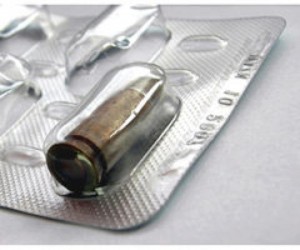Read Another shooting, another psychiatric drug—federal investigation long overdue
The Gazette Times
June 26, 2013
Meaningful public debate after the Newtown, Conn., multiple shootings vanished when NRA’s unstable president got media attention and plugged armed school guards, which didn’t work at Columbine High School in Colorado in 1999. An archetypal verbal battle ensued, pitting insistent NRA gun-holders vs. persistent ‘Brady bunch’ gun-withholders. Quaint.
Focusing on guns in school shootings is like blaming traffic accidents on cars while leaving those pesky, irrelevant drivers out. A local psychiatrist wryly commented, “Never underestimate the ability of the American people to be misinformed.” This mental condition requires misinformers (e.g. media) and misinformees (i.e. us).
Following Newtown, the Feb. 3 edition of Mid-Valley Sunday carried five letters and three columns on the vehicle, guns; nothing on what drives kids’ behaviors (e.g. medications, poor nutrition, academic stress, peers, parents, pollutants, wi-fi).
In the heat of debate, if people dizzily forget what the original issue was, don’t understand it or know what’s causing it, they should probably reconnect or get more information.
Major national and local media failed to mention the aforementioned (unmentionable?) chemical culprits — psychoactive medications — were physically involved with 90 percent of shooters, almost always at the crime scene. Psych meds are a shadowy, core presence providing tidier explanation for a 2.5-fold increase in school shootings during the 1990s over historic rates.
Newer serotonin-affecting antidepressants were first widely distributed in the 1980s. Some doctors give them at most 10 years effectiveness before inevitable physical and neurological side effects outbalance benefits. Do the math. 1980s plus 10 years. 1990s!
Like Freud in 1930, people today explain abnormal behavior via mental, emotional or psychological motives rather than considering metabolic reactions to substances or a person’s physiological state. Emotions reflect psychosocial factors, but are physically generated, nutritionally built, chemically influenced. We should consider recent extreme ballistic behaviors less as psychological and more physiological — reactions to bizarre, antagonistic pharmaceuticals. More education is needed.
Peter R. Breggin, M.D., internationally-known psychiatric drug expert, reminds us 40 years ago, before the advent of antidepressant drugs, kids got depressed and didn’t become mass murderers. Breggin states, “There is overwhelming evidence that the SSRIs and other stimulating antidepressants cause suicidal tendencies and aggression in children and adults of all ages.”
He is increasingly backed up by mainstream doctors. Harvard psychiatrist Dr. Joseph Glenmullen, who studied serotonin reuptake inhibitors, says people taking antidepressants can “become very distraught … feel like jumping out of their skin. The irritability and impulsivity can make people suicidal or homicidal.”
Even NIMH director Thomas Insel alluded to antidepressants’ lousy performance. A 2000 Psychiatric Times article revealed antidepressants perform no better than placebos overall. Numerous natural therapies test better.
In 2004, FDA extended ‘black box warnings’ for increased suicidal tendencies to all 34 antidepressants and essentially withheld approval of antidepressants’ use in depressed children, except for Prozac, the worst offender. If you can explain that, you understand modern psychiatry, which is strange and irrational.
Incidentally, 5 of 10 prescription drugs most associated with violence in FDA’s Adverse Event Reporting System are antidepressant SSRI’s/SNRI’s.
The bigger tragedy: many nutritional and natural alternatives for depression are safer, more effective and affordable but ignored for highly profitable pharmaceuticals.
This national nightmare must soon end. Parents, patients, physicians, politicians and public should be informed that psychiatric drugs, particularly antidepressants, present significant, even serious risks to youths and adults.
In a sane world where medical doctors practiced the Hippocratic Oath, psychiatrists weren’t deceived by drug company propaganda, and neither obeyed the seductive allure of kickbacks for prescribing modern snake-oil, antidepressants and other psych drugs would quickly become footnotes in history — minimally used, short-term tools — even abandoned. Let’s help them along before another national tragedy strikes.



